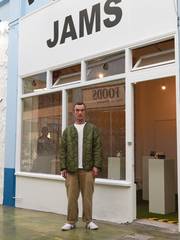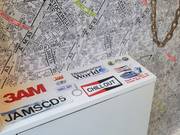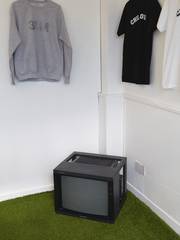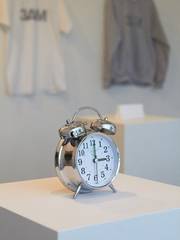Artist and Filmmaker Oliver Payne grew to prominence in the late 90s due to a set of collaborative works with Nick Relph. Their groundbreaking and emotive pseudo-documentaries featured skateboarders, musical subcultures and even England's farmland.
As a solo artist, Payne’s work focuses on ideas of subjectivity and context.His global Chill Out performance invites participants to switch off and listen to his favourite record, Chill Out - The KLF's ambient house concept album. The live soundscape promotes stillness for 44 minutes - no phones or social media - forcing people to chill out.
His love of the album has even led to a clothing line - Chill Out Relaxing Clothes. On the eve of a recent Chill Out performance, we spoke to the self-confessed video game addict about balancing commerce and art, social media’s impact on creativity, essential advice for burgeoning artists, and more...


GOODHOOD: How would you describe yourself as an artist?
OLIVER PAYNE: I make things and sometimes those things will be shown in an art gallery, and sometimes they’ll be graphics for a skateboard or music video for a band... Or something like that.
GH: Describe your creative process...
OP: It involves a great deal of thinking in silence and smoking weed. I consume a fair amount of cultural media, but not half as much as you might think. Lots of my ideas for work come out of playing, reading, writing about and thinking about ideas found in video games.
GH: How do you overcome creative blocks?
OP: I don’t really have them because I’m always excited about something. I just ask myself: What do I want to be surrounded with right now? What am I interested in? What do I want to be reading about? There’s always something that will consume me for a few months. And other things that remain a constant source of inspiration for decades.

GH: Do you think social media and people’s ease of access to camera phones has impacted the art world for better and worse?
OP: Yes - both for better and worse. Which I suppose is best described as ‘different’. It’s changed things so much that I no longer think it’s useful to look to the past to predict the future. It’s completely changed the model of how we create, experience and distribute art; no one really knows what’s gonna happen next.
GH: What’s the best thing you’ve read about yourself online?
OP: It’s always lovely when the work gets a favourable notice and I’m not mentioned at all.
GH: The Chill Out performance has a strict ‘no documentation’ policy, what’s your thinking behind this?
OP: Having a no photography rule simply forces people to be more present in the moment. Also, it’s a matter of paying respect to audience members that don’t necessarily want to be photographed. it’s a totally safe space in that regard. Also, having no documentation helps build the mythology - you really had to be there.
GH: Can you tell us anything about the Chill Out experience, apart from it being a ‘guided meditation’?
OP: It demands silence and attention. Those things are quite rare in most peoples lives. Chill Out is my favourite record and I want to share it with people. As an artwork, I think it’s interesting to present ambience as something radical. I like this idea of chilling out being a militant position.
"I THINK IT’S INTERESTING TO PRESENT AMBIENCE AS SOMETHING RADICAL. I LIKE THIS IDEA OF CHILLING OUT BEING A MILITANT POSITION."

GH: How do you want people to feel after the experience?
OP: As if they have been part of something special. That they have shared an experience with a small but growing number of people in various countries across several continents.
GH: How do you feel after the experience?
OP: Relieved mainly. I’m always slightly concerned there will be a technical fuck up and the music will cut out.
GH: What's been the most interesting or shocking thing someone has told you about their personal Chill Out experience?
OP: People very rarely speak to me after the event. They are often in a bit of a daze; I’ve had a few hardcore Chill Out fans over the years I always have respect for people who decide to leave because it’s not for them, but aren’t disruptive.
"PEOPLE VERY RARELY SPEAK TO ME AFTER THE EVENT. THEY ARE OFTEN IN A BIT OF A DAZE."


GH: Do you find it hard to balance commerce and art?
OP: Not at all. I don’t find it important to make a distinction. I do however find it very challenging to balance work and everything else. There will never be enough hours in the day for the amount of video games I would like to play.
OP: GH: When working on a new piece are there overarching themes you want to convey?
OP: Always. The content always comes before the form. I will have an idea for something before I know if it will be a video or a performance or a sculpture or whatever.
GH: The video you recently directed for Hot Chip is dope. Tell us a little bit about this, it’s super nostalgic...
OP: Thanks! Quite simply it was really just an exercise in fandom. I love hot Chip and I love old Famicom games. From a structural perspective, I’m fascinated by how user-generated content on YouTube has redefined how we receive information. Things like video game walkthroughs, tutorials and Visual essays have created a new visual language. It seems obvious to me to explore this new visual vocabulary.
GH: What are you working on at the moment?
OP: A video for Cav Empt, a book of writing about video games, a new ‘Walky-Talky’ video for instagram live and my next collection of Chill Out Relaxing Clothes.
GH: What advice would you give to yourself starting out in the art world?
OP: Just the obvious stuff that I already knew. Always be yourself and treat others how you would like to be treated. Never be intimidated by a person’s wealth or intellect. Also, I wish I had gotten into teaching earlier.
GH: A book every creative should read and why?
OP: Find a magazine from your chosen creative field from 10 years ago, Who is still relevant? Who disappeared? What changed and why? And importantly, where do you fit into all of this?
GH: What’s next for Oliver Payne...
OP: It’s my dream to make an in-flight safety film for an airline.





